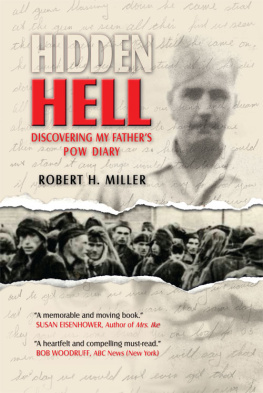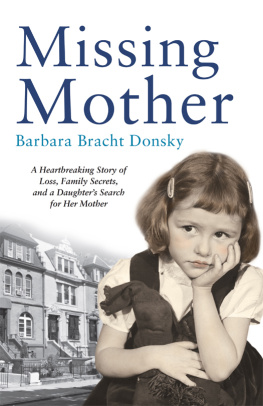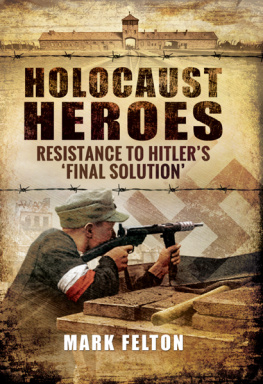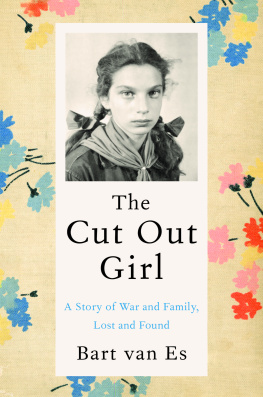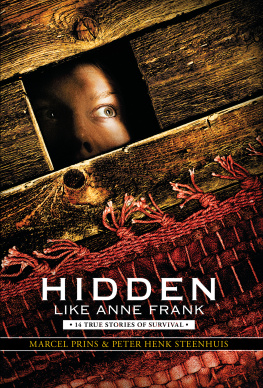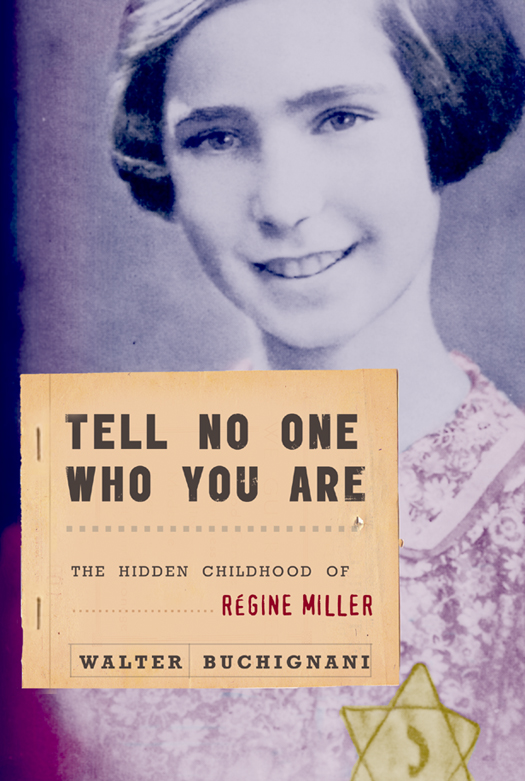The names of the first three Belgian households where Rgine Miller was hidden have been changed.
Copyright 1994 Walter Buchignani
Copyright 2008 Walter Buchignani and Rgine Miller
Published in Canada by Tundra Books,
75 Sherbourne Street, Toronto, Ontario M5A 2P9
www.mcclelland.com
Published in the United States by Tundra Books of Northern New York,
P.O. Box 1030, Plattsburgh, New York 12901
Library of Congress Control Number: 92-80412
All rights reserved. The use of any part of this publication reproduced, transmitted in any form or by any means, electronic, mechanical, photocopying, recording, or otherwise, or stored in a retrieval system, without the prior written consent of the publisher or, in case of photocopying or other reprographic copying, a licence from the Canadian Copyright Licensing Agency is an infringement of the copyright law.
Library and Archives Canada Cataloguing in Publication
Buchignani, Walter
Tell no one who you are: the hidden childhood of Rgine Miller / by Walter Buchignani.
Includes bibliographical references.
eISBN: 978-1-77049-006-2
1. Miller, Rgine Juvenile literature. 2. Belgium History German occupation, 1940-1945 Biography Juvenile literature. 3. Hidden children (Holocaust) Belgium Biography Juvenile literature. 4. Jewish children Belgium Biography Juvenile literature. 5. World War, 1939-1945 Personal narratives, Jewish Juvenile literature. I. Title.
DS135.B43M54 2008 j940.5481493 C2007-905454-4
We acknowledge the financial support of the Government of Canada through the Book Publishing Industry Development Program (BPIDP) and that of the Government of Ontario through the Ontario Media Development Corporations Ontario Book Initiative. We further acknowledge the support of the Canada Council for the Arts and the Ontario Arts Council for our publishing program.
Cover image provided by Rgine Miller
v3.1
Per mamma e babbo WB
To Fela Mucha; and to her memory RM
Contents
Foreword
T HE WAR IN EUROPE had been going on for months, but for Rgine Miller it started just after breakfast on a Friday in the spring of 1940. She was eight years old.
Rgine already knew a little about war. Every evening since Germany invaded Poland the previous September, she sat with her parents near the radio and listened to the news. Her parents had left Poland and come to Belgium when her older brother Lon was a baby. They lived in a district of Brussels among other Jewish immigrants, and everyone seemed to have relatives back in Poland. Whenever neighbors met on the street, they asked if anyone had news from those left behind. Rgines grandparents on her mothers side lived near Warsaw. She had learned the Hebrew alphabet from her father so she could write a few words in Yiddish to them, but since the war began she had not received a letter back.
The war caused other problems. Her mother spoke of how little food there was in the market when they went shopping. The war is doing it, she said. Fathers of school friends were out of work because of the war. Her own father brought home less work than before.
The war was blamed on Adolf Hitler and the Germans. She saw his picture on the front page of newspapers. She heard his name spoken with anger and fear on the streets and among the teachers at school. Only her father seemed not to be afraid. He was sure it would all end soon. Hitler wants to take over the world, but hell be stopped. England and France will stop him.
In spite of all the talk, war to Rgine was something bad that went on in other places. This war was in Poland. There had been a previous war in Spain. She knew about the war there when she was five years old. She had watched her father pack boxes of food and clothes donated by Jewish families to help the people of Spain. This was part of his volunteer work with a group called Solidarit.
Rgine did not understand much of what went on at the Solidarit gatherings. They took place in the homes of the members and there was a lot of talking. Rgines mother did not like Rgine going there. Shes too young to go to political meetings, she complained. But her father said it was never too early to learn about politics and how to make the world a better place.
Sitting beside her father, pleased to be with him, Rgine could feel how serious this new, bigger war was to the members of Solidarit as they talked about what was being done to stop Hitler and the Germans. While reports were given on the fighting, on people killed and people rescued, she liked to watch one of the women in particular. Her name was Fela; she was pretty and sure of herself and had a nice way of speaking. Rgine wanted to be like that when she grew up.
This new war was killing people, even children. But like that other war in Spain, it went on far away. Until that Friday morning. When war started for Rgine, it did not start with the sound of guns, bombs or planes. It started with the noise of her brothers feet running up the stairs.
The Spanish Civil War 1936-1939
Chapter One
I T WAS NOT YET 7 a.m. but Rgines day had already begun. She had helped her mother clear the breakfast dishes and was getting ready for school. She set down her schoolbag on the kitchen table and filled it with exercise books. She collected her pencils, dropped them into her wooden pencil box and slid the lid closed, then placed the box in her schoolbag and fastened the leather straps.
Havent you left yet? her father called from the other room. She could see him through the open door, bent over the black sewing machine with which he earned his living.
Almost ready, Papa. She went to where he was working, leaned over and kissed him on both cheeks.
The sewing machine and a large table took up most of the workroom in the apartment at 73 rue Van Lint. Handbags were piled on the table ready to be taken to the company that provided the leather and paid her father for each bag he cut and sewed. In the neighborhood, Maurice Miller was known as a maroquinier, a leather worker.
Rgine stood, watching him sew a small piece of leather.
You still here? he asked, looking up at her.
Im leaving. Im leaving.
She returned to the kitchen where her mother was wiping the table. Why is Papa always worrying? Im never late. She kissed her mother, grabbed her schoolbag and was about to go out the door.
The cole primaire elementary school Rgine attended was just a few minutes walk along rue Van Lint. Not like her brothers school. Lon Miller was fourteen and had to take the tram to get to his cole moyenne secondary school. He left the apartment early and traveled with his best friend, a boy who was also called Lon. His family, the Saktregers, lived on rue Van Lint only six doors away from the Millers. They also had a son Rgines age named Maurice who sometimes came to the Millers with his brother.
On school days, by the time Rgine got out of bed, her brother had already left and she would not see him until suppertime. Thats why on this particular morning she was surprised to hear his footsteps running up the hallway stairs. The apartment door flew open and she jumped out of the way to avoid being hit as he rushed in. The noise brought her mother from the kitchen and her father from his workroom.
Lon, whats wrong? her father asked.
No school today, her brother said, out of breath.






